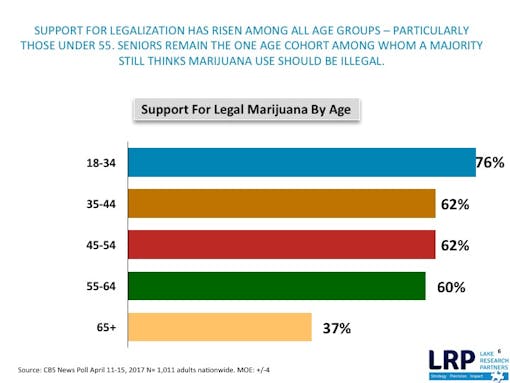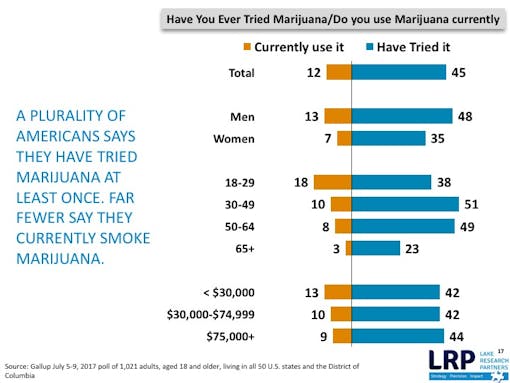‘The Haymaker’ is Leafly Deputy Editor Bruce Barcott’s weekly column on cannabis politics and culture.
“Aren’t you worried about your job?”
Friends and relatives started asking me that question late last year. I still get it a couple times a month.
The subtext is unspoken: You know, what with Jeff Sessions ready to destroy the legal cannabis industry and all.
With each passing day, polls show more Americans opposing Jeff Sessions' position on legal cannabis.
This is what I tell them: “My worry shrinks with every passing day.”
The decline of my anxiety doesn’t rely solely on the passage of time. It’s backed by data. Seemingly every season, more and more Americans come to oppose the cruel and wrongheaded cannabis position of our attorney general.
In early 2017, a Quinnipiac University poll found that 71% of Americans opposed any sort of federal intervention in states where voters approved legal marijuana. By late summer, that number had grown to 75%. Three out of four Americans now believe the federal government should leave states alone when it comes to cannabis.

In that same period, the percentage of Americans who support a federal crackdown moved from 22% to 20%—numbers that fall into tinfoil-hat territory. (A little context can be clarifying. 18% of Americans think the sun revolves around the Earth. 15% believe the government sends mind-control technology via TV broadcast signals. 7% believe the moon landing was faked. 7% also think that chocolate milk comes from brown cows.)
These Are Astonishing Numbers
The latest Quinnipiac numbers on cannabis didn’t get much play when they came out last month, largely because they were buried under sexier news—namely, the historically high (84%) disapproval rating Americans gave to Congress. The data came to light during a presentation by political consultant Celinda Lake, founder of Lake Research Partners, at a political conference organized by NORML earlier this month in Washington, DC.
The figures Lake flashed on the screen in a conference room of the Capital Hilton were astonishing. 61% of Americans now think the adult use of cannabis should be made legal in the United States. 94% of Americans believe doctors should be able to legally prescribe, or recommend, medical cannabis to their patients.
Here’s how that looks in a pie chart. (Because both Jeff Sessions and I love pie.)
Jeff Sessions vs. America on medical marijuana:

“This thing is more popular than the Fourth of July,” Lake said about medical cannabis. Medical legalization “isn’t even an issue anymore,” she added. “The public’s done with that debate.”
As for support for adult use: Expect it to continue to rise as Americans age. Check out this Lake Research graphic charting the generational differences in support:

A strong majority of Americans age 18 to 64 now support legalization. More than three in four voters age 18 to 34 support adult use. The floor, among those 18 to 64, is now 60%. Only Americans age 65 and older oppose it. And they oppose it strongly—look at that free-fall from 60% to 37% support.
Why the generation gap? I have a theory.
Something happened to cannabis in America between 1968 and 1971. It blew up on college campuses across the nation.
Four Years That Changed Everything
In the spring of 1967, only 5% of college students said they’d tried marijuana.. Two years later, that figure was 22%. By the fall of 1971, 55% of all college students were experienced with cannabis. Nearly one-third said they consumed at least once a month.

Source: Gallup; “The Nature and Extent of Marijuana Use in the United States” (Harrison et al)
Let’s connect some dots. A college freshman in 1967, when cannabis was rare, is now 68 years old. A freshman in 1971, when cannabis was common, is now 64. The huge legalization support gap we’re seeing in today’s polls may rest in part on a difference in personal experience and a cannabis comfort level that was established nearly 50 years ago. In 1967, the Beatles dropped psychedelic rock on the world with Sgt. Pepper. By 1971, the Fab Four had disbanded and John Lennon was going full primal-scream with the Plastic Ono Band. A hell of a lot changed in those four years.
A Male-Female Split in Opinion
Americans over 65 remain skeptical of adult-use legalization, but they’ve changed their minds on medical use—many because of personal experience. More women (35%) than men (32%) oppose adult-use legalization, but more men (7%) than women (2%) oppose medical use.
Here’s a graphic from Lake Research, working with a recent CBS News poll:

On that male-female split, I have a hypothesis I call the Healing Cranky Husbands theory. Older men tend to be stubborn about their health. They’d rather bitch and moan than actually do something about their pain and restless nights. Their wives eventually get fed up and pick up a tincture, vape pen, or edible for their husbands. Dammit Ed, shut up and suck on this pen for a few seconds. See what it does for ya.
Women who speak out are the most powerful force in the legalization movement.
Also, it’s not right or fair, but more women than men bear the burden of family caregiving. They’re more likely to have ground-level experience with the necessity of compassion.
They’re also a powerful political force. Moderate and conservative voters tend to discount medical marijuana advocacy when it comes from the mouths of men, who are too easily stereotyped and dismissed as stoners. Women—especially mothers of medical marijuana patients, and older family caregivers—are almost impossible to dismiss on this issue. Look at the progress that MMJ leaders like Christine Stenquist and Enedina Stanger have achieved in Utah; what Renee Petro and Jacel Delgadillo did for Florida; what Heather Shuker and others continue to do in Pennsylvania.
So yes, the data give me a growing confidence. 94% of Americans are backing medical marijuana patients against Jeff Sessions. Perhaps more importantly, women like Shuker, Stenquist, Stanger, Petro, and Delgadillo are out front, giving the issue a courageous and politically powerful face. Am I worried about my job? No. But Jeff Sessions should be worried about his.





